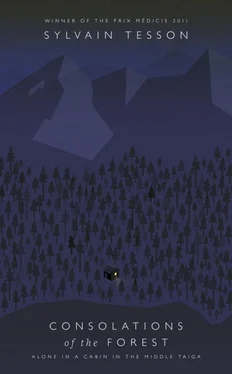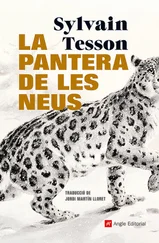Stretched out in a puddle, sipping tepid water in the rain, we have a pleasant conversation.
‘Your books are translated?’
‘A few of them.’
‘Into what?’
‘Finnish, Italian, German.’
‘Russian?’
‘No.’
‘That figures; we’re still a primitive people.’
We have to force our way through clumps of flowering rhododendrons. The pass turns out to feature a small swamp. The rain falls harder. Hippolitov suggests that we turn around, but I don’t see myself scramming back through the algal forest to spend the rest of the day in a soggy sleeping bag. We climb slopes that lead to a plateau of ‘endemic tundra’. The lichen here is springier than a nouveau riche Muscovite’s wall-to-wall carpet. Four wild reindeer graze near some old snow and we try to skulk Comanche-like around them. A hundred yards from the animals, hidden by a rhododendron, we realize that we are not the only skulkers: a brown bear is making an approach and, spotting us, freezes. The impression of competing with a bear at feeding time is not enjoyable. I get my flare gun ready and Hippolitov loads his rifle. The sharp sound of the breech startles the reindeer, which scatter, and the bear must be cursing us but never moves a muscle. Until he stands up on his hind legs. We have to wait a few seconds to find out whether he’ll about-face or charge us. That day, no need to shoot: we stare a long time at the gentle undulation, showing over the bushes, of fur in flight.
It takes us two hours to relocate the tributary along which we descended yesterday. Hippolitov has a plan. A year ago, he brought a cast-iron stove that far and would like me to get it the rest of the way to his cabin. Which costs me another two hours of fun carrying sixty-five pounds of stove, two lower corners of which dig into my back while two upper ones catch on branches, provoking with each step a truly bracing flood of chilly water. I must look like those Himalayan porters who cart the most incongruous objects through the Nepalese jungles: leather trunks, mahogany gramophones, tubs for the officers’ baths…
29 JUNE
If I’m ever launched in a space capsule, I’ll already know what it’s like to spend an entire day lying on a cot next to a galactic travelling companion. I’d brought along Kierkegaard’s The Sickness unto Death , which I would not recommend to anyone confined to a cabin by rain. Hippolitov’s little radio sputters a constant stream of pop songs and information about the 1941–45 war. Rain falls from a sky utterly lacking in imagination.
‘Mikhail.’
‘What?’
‘We’re not having any luck with the rain.’
‘But it means fewer mosquitoes.’
‘There’s that.’
Hippolitov has forgotten his book back in Elohin and stares haggardly at the ceiling as though it were about to start showing a marvellous movie. At four in the afternoon, in a burst of feverish activity, we replace the old stove with the new one, and in the fine warmth it gives off, we dispatch three little glasses of vodka in the traditional salute to ‘the first smoke’. At six, the rain slows to drizzle and we set out to climb the pyramidal peak on the eastern edge of the valley. The rain returns as we get under way. The lichen curtains are liquid veils. The mosses swallow our boots. The mosquitoes can’t find space to fly in. It takes us an hour to ascend the 1,000 feet of uneven terrain crowned with 300-year-old cedars. The trees look like ruins. Around the edges of what was once a bear’s den, the little wine-coloured bells of wild orchids bring a touch of joy to that world.
I’m awakened in the night by a mouse that’s got into my sleeping bag, which isn’t as scary as a spider – nor as nice as a Kirov ballerina.
30 JUNE
On the streets of Irkutsk, Hippolitov would pass for a proper family man with greying hair and a staid, orderly life. Every year he spends a few months in the forest, alone, visiting his six cabins strung along a line seventy miles long, and reconnecting with that conviction certain Russians have that city life must be only an interlude to life in the woods.
We head back. It’s still raining. The spellbound bushes seem to be dreaming of Thailand. With my hood pulled tight, I recall my climbs in the fragrant limestone hills of Provence. Walking in the rain, a factory for memories.
In tropical jungles, heat and humidity foster a profusion of life, but growth in the taiga doesn’t benefit from such a biological incubator. Whereas the hot jungle is in constant production, the taiga preserves. Here plant growth is slow, but decomposition doesn’t clear out the understorey as quickly as it does in the lower latitudes. A Siberian cedar can take years to rot. In both cases, vegetable chaos encumbers the ground, the result of tropical exuberance elsewhere, and of biostasis here. The cold jungle is a plant museum; the hot jungle, a chlorophyllian laboratory.
In Elohin, my little dogs are waiting, and I have lunch with Volodya, Irina and Hippolitov: blini with char caviar. There’s never enough caviar. But much too much vodka.
Then, scooping into the coffee-coloured lake, I row home.
1 JULY
A day of fishing. A piscivore, drawing nourishment from a lake, undergoes a psycho-physiological transformation. His cells feed on phosphorus, and his character absorbs the essence of the fish. What he loses in red-blooded strength he gains in placidity, taciturnity, dexterity, competence, and restraint.
I catch eight char. The frightened eyes of fish, as if they’d seen forbidden things.
Aika and Bek steal three of my catch. I can’t even bring myself to scold them. If I were raising kids, they’d wind up juvenile delinquents.
2 JULY
The air is loaded with bugs. A rumbling hum begins with the first glimmers of light and never falters until nighttime. Beetles crawl along the beams in the cabin, and the capricorn beetles show a particular fondness for my shelves. Gadflies with nightmarish eyes torment the dogs. If these insects weighed ten or twenty pounds, as they did in the Carboniferous period, we’d be a lot less full of ourselves.
3 JULY
Spring, the opening of the floodgates.
The waterfall is flowing free again.
Atop the 160-foot rock wall, water escapes via even the slightest gulley, covering the schist with rushing white streamers. Thanks to some acrobatics along a winding mountain track that cuts its way up to the summit, I reach the head of the falls, and the vertiginous vision of this clear mountain cascade plunging into the void.
In the evening, the dogs fight. Their jaws snap like the clashing of sabres. This grey beach: could there ever be a more beautiful place in which to witness a samurai battle, or wander in search of a word, or recite a poem? I live at the edge of a wood, before a vast plain of water, on the rim of a submerged cliff line rooted 5,000 feet underwater and rising 6,500 feet into the sky. All these spaces meet at the cabin.
4 JULY
Luxury? Twenty-four hours at my complete disposal each and every day, for the fulfilment of my slightest desire. The hours are tall girls of shining white standing in the sunlight to serve me. If I want to spend two days on my cot reading a novel, who’s to stop me? If I feel like taking off at twilight into the forest, who will dissuade me? The solitary woodsman has two loves, time and space. The first he uses as he pleases; the second he knows through and through.
I stay in my hammock in the broiling sun (72° Fahrenheit!). When I write on the beach, the dogs amble over to flop down at my feet: the Baikalian version of an Irish-country-house spaniel, dozing while his mistress reads.
Читать дальше












